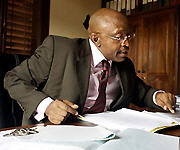



In Cameroon, Globalization's Losers Fight Back and Win
CAMEROON - It is an uninterrupted popular referendum, a global plebiscite that takes place in the world's supermarket coolers. With each product they pull off the shelves, consumers determine the production and living conditions of chickens, turkeys and geese, as well as the marketing of their meat in a networked world.Taking on the Global Market
 |
| Bernard Njonga, president of the ACDIC, helped to stop frozen chicken imports in Cameroon. |
It is an uninterrupted popular referendum, a global plebiscite that takes place in the world's supermarket coolers. With each product they pull off the shelves, consumers determine the production and living conditions of chickens, turkeys and geese, as well as the marketing of their meat in a networked world. The object of consumer desire in Europe, the United States and all other affluent countries is the breast fillet, free of bones and low in fat. The remainder of the animal is practically unsellable in these industrialized countries.
Seeking to satisfy consumer desires, poultry breeders create strains with giant breasts. This sector of the global poultry market is dominated by just three companies. One of them, Aviagen, owns the Wesjohann chicken farming dynasty in the German state of Lower Saxony. Its model, "Ross 708," comes complete with a detailed manual, which explains how the complicated interactions among light, air, feed and water must be managed in coops, which are sealed off from the outside world, to get the optimal performance out of a chicken.
Source: Icicemac











